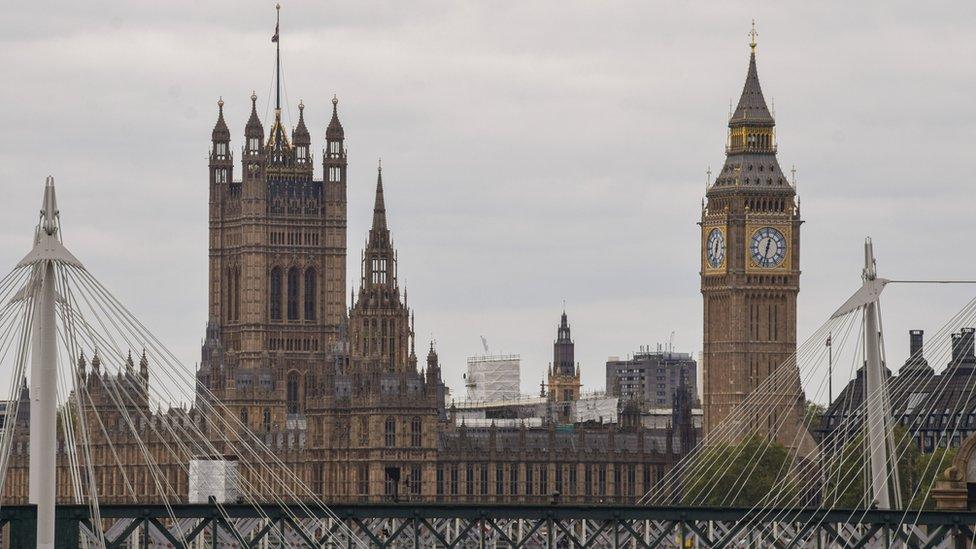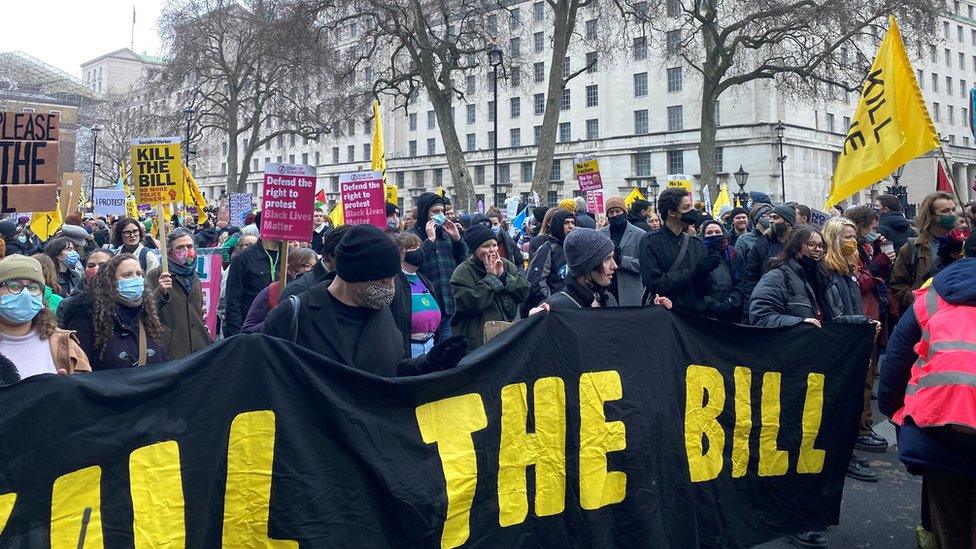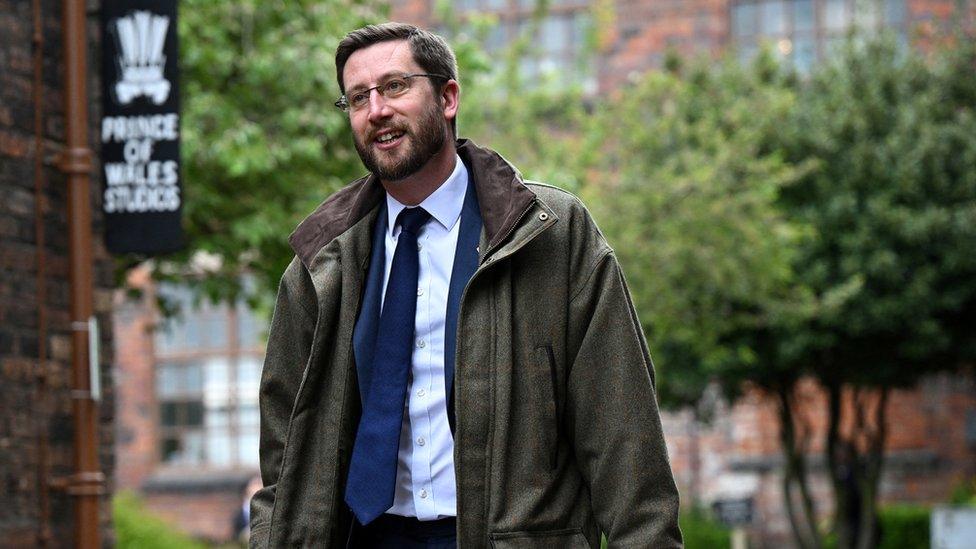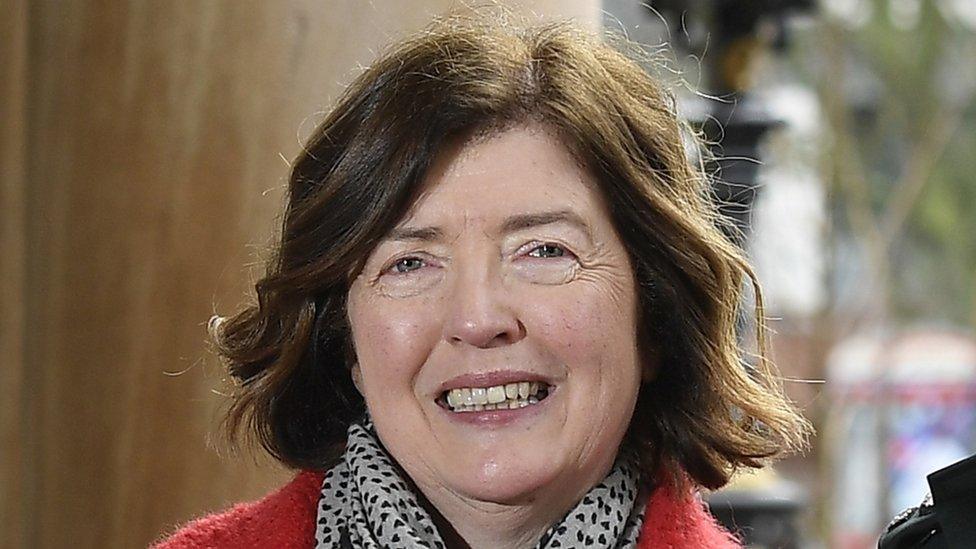What's happening in Parliament next week?
- Published

Parliament gets back into the business of law-making next week, as the first bills promised in this year's Queen's Speech (and one that wasn't even mentioned) are fed into the Commons and the Lords.
Meanwhile, several long-running sagas continue to loom over Westminster.
So, as well as debates on major new laws like the Public Order Bill and the Northern Ireland Troubles Bill, there will be a general debate on Ukraine and some kind of statement or urgent question on the outcome of the Met's Partygate investigation.
This will come alongside the long-awaited publication of Sue Gray's report, also expected next week.
All sides will also be on the alert for policy initiatives relating to the Northern Ireland Protocol and the cost of living crisis.
On the law-making front, MPs have their first look at the Public Order Bill (Monday), which resurrects a series of measures the Lords blocked from being added to the Police, Crime, Sentencing and Courts Bill in the previous session.
They include new criminal offences of locking-on and going equipped to lock-on, aimed at stopping protesters from attaching themselves with chains or glue or whatever, to objects or buildings to cause serious disruption.
There will be a maximum penalty of six months' imprisonment, an unlimited fine, or both.
The bill also includes new offences of obstructing major transport works, covering the construction or maintenance of transport projects such as HS2, and of interference with key national infrastructure including airports, railways, printing presses and downstream oil and gas infrastructure.
These will be backed up with new stop-and-search powers for the police and new Serious Disruption Prevention Orders targeting protestors with prohibitions or requirements which could include electronic tagging.

The government's previous policing bill attracted protests across the country earlier this year
Tuesday sees MPs debate the Northern Ireland Troubles (Legacy and Reconciliation) Bill, which will attempt to investigate more than 1,000 unsolved killings, and offer immunity from prosecution for those who co-operate with a new Independent Commission for Reconciliation and Information Recovery (ICRIR), which will be headed by a senior judge.
There is support from Conservative MPs like former defence minister Johnny Mercer, who have been infuriated by continuing prosecutions of former service personnel over events during the Troubles.
But the reaction from the Northern Ireland parties, the DUP, the UUP, the Alliance Party and the SDLP has been hostile and they look set to provide stiff opposition.
The Lords provide the launch pad for some of the more technical or less contentious bills, starting on Monday with the Schools Bill, which aims to boost academisation and will offer more targeted support to children and families who are most in need across England.
Parliamentary sub-plots
Monday will also see a second reading for the Social Security (Special Rules for End of Life) Bill, which will raise the threshold in the definition of terminal illness to having 12 months or less to live rather than the existing six.
On Tuesday it's the UK Infrastructure Bank Bill, which will aim to support economic growth and the delivery of net zero. On Wednesday comes the Procurement Bill, which replaces EU rules on how the government buys services from the private sector.
Westminster Hall debates are often worth watching for rumbling parliamentary sub-plots - so keep an eye on Conservative Bob Seely's debate on foreign lobbying in the UK on Wednesday.
MPs' continuing interest in local green schemes resurfaces in the form of Justin Madders's Tuesday debate on a hydrogen village in his Ellsmere Port constituency.
There's plenty of interesting committee action - but what had looked like the juiciest morsel has been snatched away.
Cabinet Secretary Simon Case and government ethics chief Darren Tierney had been due to give evidence to MPs on the Public Administration and Constitutional Affairs Committee.
But the committee has been told ministerial approval for the pair to appear has been pulled, much to the displeasure of its Conservative chair William Wragg. The hearing has been rescheduled for late June.
They had been set be quizzed on the Greensill lobbying affair, plans to cut 90,000 jobs from the Civil Service, as well as the Partygate saga.

MPs will have to wait until the end of next month to hear from Simon Case
Among the meetings that look set to actually happen, on Tuesday the Business, Energy and Industrial Strategy Committee will question Business Secretary Kwasi Kwarteng and the current and former heads of Ofgem about the price of energy.
On Tuesday, the Defence Committee questions General Sir James Everard, former NATO Deputy Supreme Allied Commander Europe, as part of its inquiry examining the UK's relationships with NATO and the US.
The prospect of Finnish and Swedish membership (and the implications of their potential accession) is likely to be discussed.
On the same day, Foreign Affairs questions former foreign secretary Philip Hammond about the government's approach to state-level hostage situations, with the case of Nazanin Zaghari-Ratcliffe, and the £400 million payment of a frozen debt dating from the 1970s that led to her release, very much in mind.
Home Affairs examines the 10-year drugs strategy for England when it takes evidence from government adviser Prof Dame Carol Black on Wednesday. The Committee will also hear from local authorities about treatment and recovery services.
Watch out too on Wednesday for the election to replace Neil Parish as chair of the Environment, Food and Rural Affairs Committee. The Speaker will announce the results in the chamber in the afternoon.
Related topics
- Published20 May 2022

